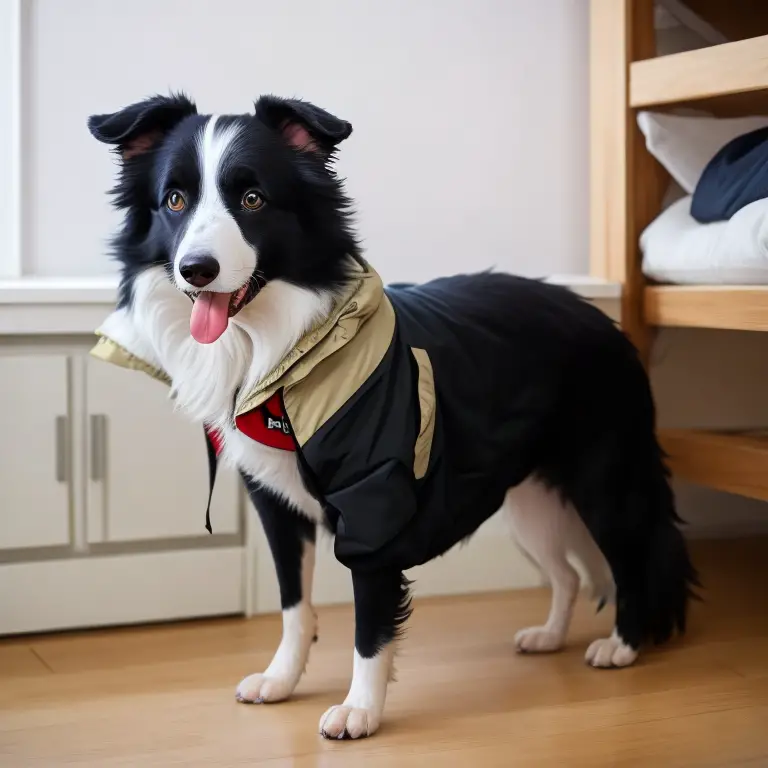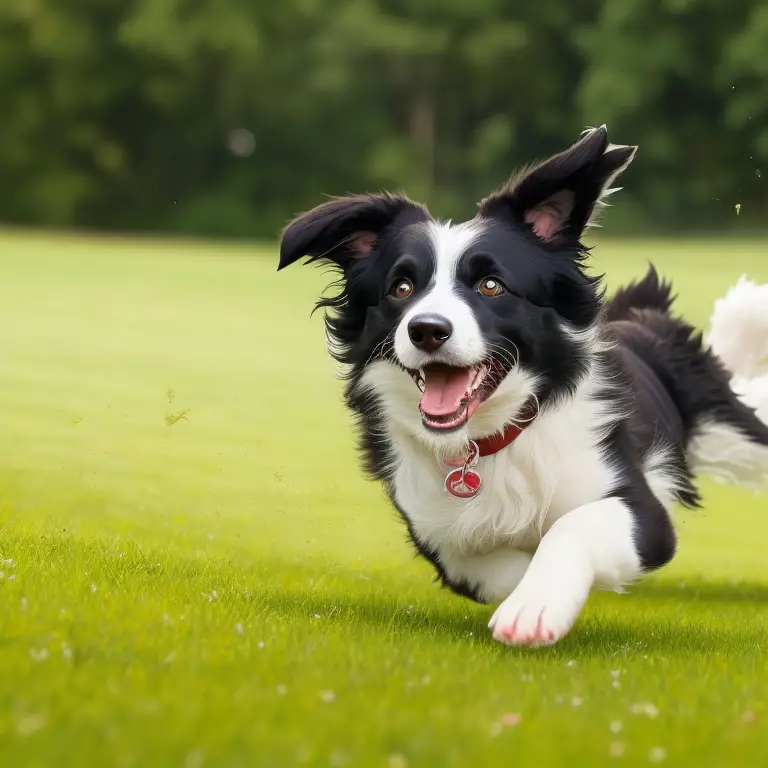Are Border Collies Suitable For Homes With Small Living Spaces?
Have you ever been mesmerized by the intelligence and agility of Border Collies on TV? Perhaps you considered getting one, only to realize that space is a limiting factor in your living space?
Fear not, because this article is here to help.
In this post, we’ll discuss the history and characteristics of Border Collies, as well as whether they are suitable for small living spaces. We’ll also provide tips and advice on how to make it work if you decide to adopt this amazing breed into your home.
Let’s dive in!
| Factors | Yes | No |
|---|---|---|
| Size | No | Yes |
| Activity Level | No | Yes |
| Training Needs | No | Yes |
| Temperament around Others | Depends | Depends |
| Overall Suitability | No | Yes |
Characteristics of Border Collies
Physical characteristics
Border Collies are medium-sized dogs that have a lean and athletic build. They have a double coat, with a thick and fluffy undercoat and a shiny, weather-resistant outer coat, which helps them to withstand different weather conditions.
Their coats come in various colors, including black and white, blue and white, and red and white.
These dogs have a unique appearance that distinguishes them from other breeds. They have an intelligent and attentive expression, with bright and alert eyes that are medium-sized and oval-shaped.
Their ears are high-set and stand erect when they are alert, giving them a regal appearance.
Border Collies are known for their agility and athleticism, making them excellent competitors in sports like agility, obedience, and flyball. They are also known for their incredible speed and stamina, which makes them great running partners or hiking companions.
Overall, Border Collies have physical characteristics that make them an ideal breed for active families or individuals who enjoy spending time outdoors and engaging in physical activities.
However, it’s essential to ensure that they receive proper exercise and mental stimulation, regardless of the living space available.

Behavioral characteristics
Border Collies are known for their striking behavioral characteristics, which make them one of the most popular dog breeds in the world. They are highly intelligent, energetic, and trainable, which makes them perfect for various activities such as herding, agility, and obedience competitions.
However, owners should be aware of their behavioral traits before deciding to adopt them, especially in small living spaces.
Border Collies are highly active dogs that require plenty of exercise and mental stimulation daily. This is because they have strong herding instincts that make them prone to boredom and destructive behavior such as chewing and digging when left unoccupied.
As a result, they are not ideal for homebodies or owners who prefer low-energy dogs that require minimal exercise.
They also tend to become attached to their owners and develop separation anxiety when left alone for long periods. This behavior often leads to excessive barking, whining, and destructive behaviors such as chewing and digging.
As a result, owners who work long hours may not be suitable for owning a Border Collie.
Moreover, Border Collies are highly trainable and eager to please, which makes them easy to obedience train. They also tend to be sensitive to their owners’ moods, tones, and energy, which makes them a good fit for experienced dog owners who can provide consistent training, structure, and positive reinforcement.
Border Collies have unique behavioral characteristics that make them a fantastic addition to any home.
However, their highly active nature and strong herding instincts may not be suitable for small living spaces or owners who cannot provide daily exercise and mental stimulation. As a result, adopting a Border Collie requires careful consideration of their behavioral traits, as well as adequate time, effort, and patience to train and care for them.

Exercise needs
Exercise is a crucial aspect of a Border Collie’s life, and they require a significant amount of it to stay healthy and happy. These dogs are energetic and agile, making them highly active and playful.
They need at least an hour of vigorous exercise every day to release their pent-up energy.
The lack of adequate exercise can lead to destructive behaviors and anxiety disorders. Therefore, if you’re considering getting a Border Collie for your small living space, you need to be prepared to provide ample exercise opportunities for your pet.
Regular walks and outdoor playtime are essential to ensure that your Border Collie remains active and engaged.
Make sure you have a sufficient space for your Border Collie to stretch its legs. With that said, indoor exercises can be just as good as outdoor activities.
Games like fetch, tug-of-war, and hide-and-seek can provide excellent exercise opportunities while inside.
Try to burn off your Border Collie’s energy by scheduling regular playtime sessions throughout the day. Exercise is a non-negotiable requirement for Border Collies.
If you’re interested in getting one for your small living space, you need to ensure that you can provide sufficient exercise and outdoor activities to keep your pet happy, healthy, and well-behaved.

Mental stimulation needs
Border Collies are highly intelligent dogs that require a significant amount of mental stimulation alongside regular exercise. Mental stimulation is necessary to keep them engaged and happy.
Without it, they can become restless and may develop destructive behavior.
Mental stimulation can be provided through various activities like training, interactive games, or even puzzle toys. Providing training sessions can be an excellent way to keep your Border Collie mentally stimulated.
These dogs respond well to positive reinforcement training methods and are quick learners.
Regular obedience training can help to strengthen the bond between you and your pet. Interactive games also provide a great way to stimulate your Border Collie’s mind.
Playing games like hide-and-seek or playing with puzzle toys can keep your pet engaged while you’re away from home.
Border Collies need regular mental stimulation to keep them happy and healthy. Providing training sessions, interactive games, and puzzle toys can help fulfill their mental stimulation needs.
As an owner, you must ensure that your pet receives adequate mental stimulation alongside regular exercise to help them adjust to living in smaller spaces.
Considerations for small living spaces
Lack of space and exercise
Living in a small space can pose a challenge for Border Collies as they are high-energy dogs that require plenty of exercise to stay happy and healthy. Lack of space and exercise can lead to obesity and behavioral issues such as destructive chewing or barking.
However, this does not mean that Border Collies cannot thrive in small living spaces.
With proper training and attention to their needs, they can adapt and be content in a cozy home environment. It’s essential to provide them with opportunities for exercise, such as daily walks and indoor playtime, and mental stimulation options like puzzle toys or training activities.
If you live in a small space and are considering getting a Border Collie, it’s crucial to acknowledge their exercise requirements and be prepared to dedicate time and effort to meet their needs.
Understanding their behavioral tendencies and providing them with the appropriate care can lead to a happy and healthy life together.
Adaptability
When it comes to adaptability, Border Collies can do relatively well in small living spaces as long as they receive sufficient exercise, mental stimulation, and training. These dogs are highly intelligent, energetic, and require mental and physical activities to remain happy and healthy.
Their adaptability also depends on individual training and personality traits.
With proper socialization, training, and positive reinforcement techniques, Border Collies can adapt to apartment living or small homes without a backyard. However, if you don’t have enough time to dedicate to exercise and training, they may become unhappy, bored, or even develop destructive behaviors.
It is also essential to note that every dog has a unique personality, and some may find it challenging to adapt to smaller living spaces.
In summary, Border Collies can be adaptable to small living spaces as long as they receive enough exercise, mental stimulation, and training. It’s crucial to consider the individual dog’s personality and needs before bringing them into a small living space.
Barking tendencies
Border Collies are known for being vocal and have a tendency to bark, which can pose a challenge for small living spaces. If barking tendencies are a concern for you, then a Border Collie may not be the best fit for your home.
However, with appropriate training and socialization, you can prevent excessive barking and instead teach them to bark only when necessary.
It’s important to note that barking is a natural communication method for dogs, and trying to completely eliminate it may not be feasible. It’s essential to provide mental and physical stimulation to prevent boredom and anxiety, which can lead to excessive barking.
Providing enough exercise, mental stimulation, and playtime can help reduce barking tendencies in Border Collies.
Consistent training, positive reinforcement, and establishing a routine are also essential in preventing excessive barking. Overall, if barking tendencies are a concern, make sure to consider the breed’s natural tendencies before deciding to bring a Border Collie into your small living space.
Separation anxiety
When it comes to considering Border Collies for small living spaces, one important factor to keep in mind is their susceptibility to separation anxiety. Border Collies are known for forming very strong bonds with their owners, and when left alone for too long, they may start to exhibit destructive behaviors in response to their anxiety.
If you’re considering a Border Collie for your small living space, you’ll need to make sure you have a plan in place for managing their anxiety while you’re away.
This may mean crate training, hiring a dog walker or pet sitter, or gradually building up to longer periods of alone time through gradual training. Ultimately, if you love the breed and are willing to put in the effort, you can make a Border Collie work in a small living space – but it’s important to be prepared for the potential challenges of separation anxiety.

Tips for making it work
Indoor exercise ideas
When it comes to providing indoor exercise for Border Collies in small living spaces, there are a variety of options. Here are some straightforward ideas:
- Indoor fetch – use soft toys or balls to play fetch in a hallway or other open space in your home.
- Tug of war – a game of tug of war can be a great way to give your Border Collie a workout.
- Hide and seek – hide treats or toys around your home and encourage your dog to find them, providing mental stimulation and exercise.
- Stair climbing – if you have stairs in your home, encourage your Border Collie to climb them for some physical activity.
- Agility courses – set up a small agility course using household items like chairs and broomsticks to provide a mentally stimulating workout.
Remember, while indoor exercise can be helpful, it’s important to also provide your Border Collie with regular outdoor exercise opportunities to meet their exercise needs.

Training and obedience
Training and obedience are paramount for Border Collies, regardless of their living space. These dogs are highly intelligent and need mental stimulation to keep them happy and healthy.
Here are some tips for training and obedience in small living spaces:
- Regular training sessions: Consistency is vital in training dogs, particularly in small living spaces. Keep training sessions short and frequent to ensure your Border Collie understands and retains what they learn. Using positive reinforcement techniques like treats or playtime will make training fun for your furry friend and bond you two together.
- Teach basic obedience commands: Border Collies thrive on routine and structure, so it’s essential to teach them basic obedience commands like “sit,” “stay,” and “come.” Repetition and consistency when teaching and practicing these commands will lead to a well-behaved dog who understands boundaries.
- Enroll in an obedience class: Obedience classes can be beneficial not only for your dog’s behavior but for socialization purposes. Small living spaces may make socializing difficult, so an obedience class will help your pup interact with other dogs and people in a safe, controlled environment.
Remember, Border Collies are smart and energetic dogs who need both physical exercise and mental stimulation to thrive. Training and obedience are crucial, particularly in small living spaces where it can be challenging to provide enough exercise.
By using these tips and seeking additional support from professionals, you can raise a happy, healthy, well-behaved Border Collie in any living space.
Consistency
Consistency is key when raising a Border Collie in a small living space. This breed thrives on routines and structure, so it is important to establish and maintain a consistent schedule for feeding, exercise, and training.
When it comes to training, using the same commands and rewarding good behavior consistently is crucial.
This ensures that your Border Collie understands what is expected of them and encourages them to continue good behavior. Consistency also applies to mental stimulation.
Providing mental exercises and activities on a regular basis keeps your Border Collie’s mind engaged and prevents boredom, which can lead to destructive behavior.
To make it work in a small living space, set up a designated area for your Border Collie’s food and bed, and stick to a consistent exercise routine, even if it means indoor activities or short walks. Always be consistent with your actions and expectations when it comes to your Border Collie’s behavior, as this will create a happy and well-rounded companion.

Mental stimulation options
When it comes to mental stimulation, Border Collies are a breed that requires a lot of it. Fortunately, there are many options to keep your furry friend’s mind active and engaged even in a small living space.
Some mental stimulation options for Border Collies include puzzle toys, interactive games, scent training, and obedience training.
With puzzle toys, your dog can work to solve a puzzle that contains treats, helping to keep their mind active. Interactive games like hide-and-seek or fetch can also provide mental stimulation and physical exercise.
Scent training can help your Border Collie tap into their natural instincts and use their nose to find hidden objects.
Additionally, obedience training is a great way to stimulate your dog’s mind and improve their behavior through rewards and positive reinforcement. By incorporating these mental stimulation options, you can help keep your Border Collie happy and healthy, even in a small living space.

Conclusion
While Border Collies are known for their intelligence, agility, and herding ability, their suitability for small living spaces depends on various factors. It is important to consider their exercise and mental stimulation needs, as well as their adaptability and barking tendencies.
To make it work, owners of small living spaces can explore indoor exercise options, prioritize training and obedience, be consistent, and provide mental stimulation.
With dedication and creativity, Border Collies can thrive in small living spaces. However, it is crucial to ensure that their needs are met to avoid behavioral issues such as separation anxiety.
Ultimately, Border Collies require committed and responsible ownership regardless of living circumstances.
By providing a safe, loving, and stimulating home, owners of small living spaces can enjoy the rewarding companionship of a Border Collie.







